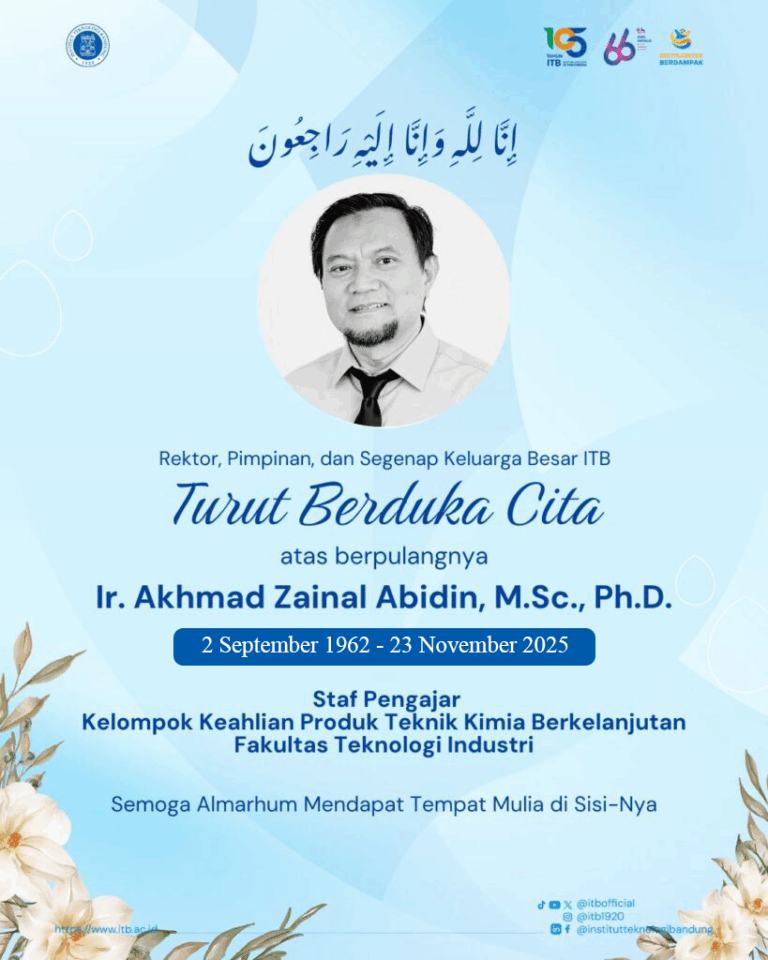
* Dr. Ir. Lienda Aliwarga Handojo, M.Eng., Received the best poster award in the 2018 Indonesian Palm Oil Research Week in Bandung (Personal Doc.)
News Source : www.itb.ac.id
BANDUNG, itb.ac.id – Indonesia is known as one of the largest producers of crude palm oil in the world. Data from the Central Statistics Agency (BPS) in 2017 states that Indonesia has 12.3 million hectares of oil palm land with 34.4 million tons of crude palm oil.
Dr. Lienda is a lecturer in the Chemical Engineering Study Program, Bandung Institute of Technology who has been carrying out his work since 1979. In the midst of his busy teaching, he conducted research on the use of calcium fat as a animal feed supplement.
“Me and his team, Dr. Antonius Indarto and Dr. Dian Shofinita are currently researching the development of technology for the production of animal feed supplements using raw materials from the side of palm oil refining. This is expected to increase added value and produce products that benefit farmers, to increase production their cow’s milk, “Dr. Lienda.
She’s research has begun since 2016 when the Palm Oil Plantation Fund Management Agency (BPDPKS) held a funding selection for oil palm research and development. “At that time we submitted a proposal and this research was among those chosen to be funded,” She said.
Making calcium fat from PFAD involves complex phase changes. Starting from the solid phase, it turns into a concentrated liquid which is concentrated due to heating and addition of calcium solids, then expands rapidly until the volume reaches six times, then suddenly freezes again. Lienda said that special reaction techniques and reactor designs are needed so that this exothermic reaction can produce products with the desired composition. “The addition of calcium is intended so that the fat given as a supplement does not interfere with the digestion of livestock,” explained the Chairperson of the ITB Biomass and Food Chemistry Expertise Group.
Calcium fat from the study by Dr. Lienda and this team has also been tested in vitro and in vivo directly into livestock. In-vivo testing was carried out at the Lembang cattle farm, which is a milk center in West Java. Good results are shown in both tests. “In-vitro tests which include food digestibility, organic matter, ammonia content, and volatile fatty acids show our products are superior to commercial supplements,” She said.

* Visit of oil palm BPDP to Chemical Engineering ITB to review the results of research funded by BPDPKS (Personal Doc.)
“Likewise, the in-vivo test showed that the milk production of calcium-fed cow was 16% higher than that of non-supplemented cows and 4% higher compared to commercial supplements. Cows that are given calcium fat are physically healthier and more fertile because after giving birth usually dairy cows tend to experience a decrease in health and bone loss due to continuous excretion of milk without being balanced with appropriate intake, “She explained.
Dr. Lienda and the team’s hard work paid off sweetly because they had obtained three patents at once. “Three patents, namely patent processes, tools, and compositions have been made related to the production of calcium fat supplements. We are currently working on all the facilities to work with potential investors in producing calcium fat so that the product can be used to increase milk cow milk productivity in Indonesia. This is in line with what was stated by the Ministry of Industry, which is to increase local milk production, which in 2017 can only fulfill 23% of domestic demand to 60% by 2025, ” She said.
For this research, Dr. Lienda also became one of the 12 lecturers who received the Award for the Field of Work and Innovation at the commemoration of the 60th Anniversary of ITB. Not complacent, She plans to continue to develop the results of his research. “In the future we will also research poultry supplements that will be useful for poultry farmers in Indonesia,” She concluded.
Reporter: Billy Akbar Prabowo (Metallurgical Engineering 2016)

Wafatnya Seorang Inovator (Oleh Ir. Gilarsi W.S. TK81)

Obituari Untuk Sahabat Ir. Akhmad Zainal Abidin, M.Sc., Ph.D. oleh Prof. Yazid Bindar.

